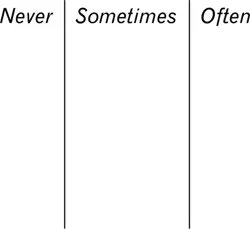
Managing Intense Emotions and Overcoming Self-Destructive Habits
A Self-Help Manual
Lorraine Bell
- 240 pages
- English
- ePUB (mobile friendly)
- Available on iOS & Android
Managing Intense Emotions and Overcoming Self-Destructive Habits
A Self-Help Manual
Lorraine Bell
About This Book
What is borderline personality disorder and what can people with borderline problems do to help themselves?
The treatment of personality disorder is a major concern facing current mental health services. Specialist therapies are often not available and many people with these problems drop out of treatment. Managing Intense Emotions and Overcoming Self-Destructive Habits is a self-help manual for people who would meet the diagnosis of 'emotionally unstable' or 'borderline personality disorder' (BPD), outlining a brief intervention which is based on a model of treatment known to be effective for other conditions, such as anxiety, depression and bulimia.
The manual describes the problem areas, the skills needed to overcome them and how these skills can be developed. It is designed to be used with the help of professional mental health staff, ideally in a group with individual sessions to support and coach the person in the application of the skills taught. A minimum of 24 and maximum of 36 sessions are recommended. Areas covered include:
* the condition and controversy surrounding the diagnosis of BPD
* drug and alcohol misuse
* emotional dysregulation and the role of thinking habits and beliefs
* depression and difficult mood states
* childhood abuse and relationship difficulties
* anger management.
Borderline personality disorder is a complex and challenging condition. This manual aims to explain the problems experienced by people who may be given this diagnosis in a way that clients and staff can easily understand. It will be essential reading for people with BPD and professionals involved in their care - psychologists, psychiatric nurses, psychiatrists and occupational therapists.
Frequently asked questions
Information
1 Understanding the problems and first steps
1 Introduction
Common Problems
- getting bored easily and doing risky things ‘for the hell of it’
- losing your temper a lot
- being moody, getting irritable
- hating the way you look, changing your appearance a lot (hair, clothes, make-up)
- feeling desolate and lonely when alone
- feeling uncomfortable in a close relationship, or that people are trying to control you
- flirting habitually and getting a buzz from sexually attracting others
- feeling very jealous of other people, especially if they are liked by people you want to like you
- being suspicious of people and feeling paranoid (e.g. thinking that people are talking about you)
- having sex with people you don't know well in the hope of getting affection
- getting a buzz from doing things you're not supposed to, like stealing, getting lifts from strangers, taking drugs
- hating or blaming yourself at times and/or hating or blaming others
- doing things to try and please people and get them to like you (e.g. buying them presents)
- neglecting yourself and doing things which are not good for you or harmful
- finding it difficult to maintain relationships
- not knowing who you are and looking for something or someone to give you a sense of identity
- changing life goals, priorities, feelings, or confusion about these
- rapid intense changes in mood
- overwhelming urges to hurt or punish yourself
- not coping when people leave you, desperately clinging on to them or going to extreme lengths to try and get them back
- feeling deeply unloved and longing for someone to take care of you.
- Do your relationships with people you really care about have lots of ups and downs? Are there times when you thought they were everything to you and then other times when you thought they were terrible? How many relationships are like this?
- My feelings toward people in close relationships don't change that much.
- I do experience different feelings in close relationships, but these are not intense or frequent.
- I have had one prolonged relationship or several brief relationships in which I have experienced changes in intense positive and negative feelings.
- Have you often done things impulsively? What kinds of things? Tick if you have done any of the following

- buying things you couldn't afford
- having sex with people you hardly know, or having ‘unsafe’ sex
- drinking too much
- taking illegal drugs
- driving recklessly
- uncontrollable eating
- shoplifting or stealing
- gambling
Which is true for you?- I am never impulsive.
- I am impulsive in one area that could be self-damaging.
- I am impulsive in two or more areas that could be self-damaging.
- Are you a ‘moody’ person? How long do your bad moods last? How often do these mood changes happen?
- My mood does not change much.
- I am a little moody.
- I have frequent mood shifts.
- Do you often have temper outbursts, or get so angry that you lose control? Do you ever hit people, damage property or throw things? Do you ever provoke an argument or get into fights? Do even little things get you very angry?
- I am rarely angry.
- I do get angry but it isn't a major problem.
- I frequently lose my temper, am constantly angry, or have difficulty controlling my anger. I tend to get into physical fights.
- Have you tried to hurt or kill yourself or threatened to do so? Have you ever taken an overdose? Have you ever scratched, cut...